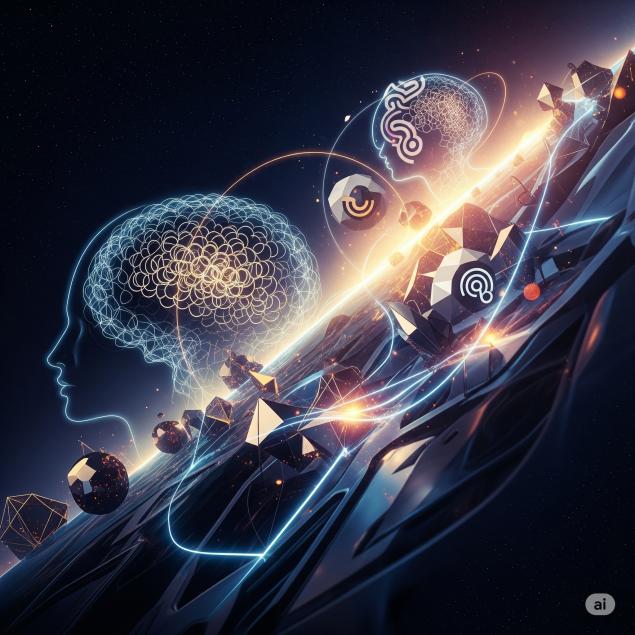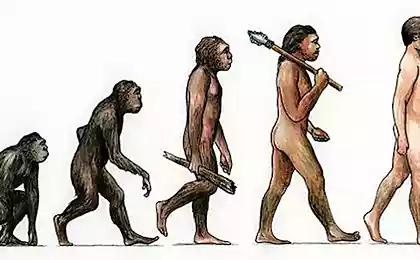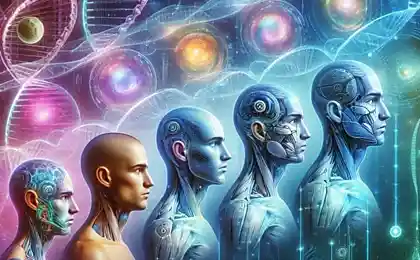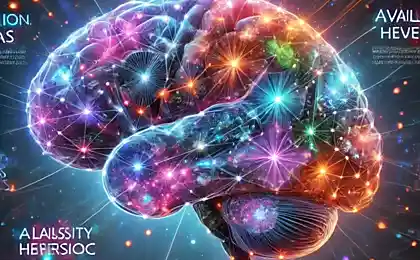220
Each person belongs to one of the following types: 0.8, 1.0 or 1.2.

In a world where the pace of life is accelerating every day, and information descends on us in an avalanche, understanding human potential becomes not only interesting, but vital. We often wonder why some people achieve outstanding success, others struggle with daily tasks, and still others seem to be constantly stagnant. The answers to these questions lie not only in education, social status, or personal connections. There is a deep, almost archetypal mechanism that determines our cognitive and adaptive abilities.
Imagine that each person is born with some kind of “efficiency ratio” of their neural network, some original “software” that affects the speed of information processing, creativity, ability to learn and adapt. We propose to consider the hypothesis of the existence of three fundamental types of people, conventionally designated as 0.8, 1.0 and 1.2. This theory is not a strict classification in the usual sense, but rather a metaphorical framework for understanding the variability of human potential and behavior. It combines data from neuroscience, cognitive psychology and sociology, offering a fresh look at the dynamics of human interaction and development.
Our brain is not just a set of neurons, but a complex biocomputer, the potential of which is not always disclosed. We believe that understanding these “coefficients” can be the key to a more effective self-fulfillment and harmonious society.
Type 0.8: Conservatives and Adaptants
People conditionally belonging to type 0.8 are characterized by a relatively slow processing of information and a less pronounced ability to quickly adapt to new conditions. This does not mean that they are inferior, but rather points to a different strategy of survival and development. Their thinking is more linear, they prefer time-tested methods and stability. In a rapidly changing world, this can be a challenge, but in certain areas, their qualities are invaluable.
For example, in traditional professions that require routine but accurate work (accountants, archivists, operators of complex systems, where each step is strictly regulated), people of the 0.8 type perform best. Their strengths are attention to detail, diligence, reliability and high performance. They can be excellent custodians of tradition, ensuring stability and order in society. Their ability to concentrate deeply on a single task allows them to achieve mastery in narrow areas. However, they are characterized by a lower rate of response to unexpected changes and a potential propensity to procrastinate when faced with uncertainty.
Take the story of Anna, who has always had difficulty learning new technologies. She found it difficult to master new programs, and she often felt uncomfortable in the rapidly changing IT world. But when she was offered the position of archivist in a historical museum, her attention to detail and scrupulousness proved invaluable. Anna could spend hours codifying old documents, finding subtle connections, and recovering lost pieces of history that other types of people could quickly lose interest in.

Recommendations for type 0.8:
- **Be aware of your strengths: Your reliability and attentiveness are your main assets. Focus on professions and tasks where these qualities are in demand.
- **Create a structured environment:** Organize your life and work in ways that minimize surprises and maximize predictability.
- **Master one or two key competencies: **A deep dive into one or more areas will make you an indispensable specialist.
- **Slow learning methods:** Prefer a deep but gradual mastery of information rather than a quick scan of surfaces.
- ** Find a mentor or interpreter:** Talk to people who can help you adapt by explaining complex concepts in simple language.
Type 1.0: Balancers and Adapters
This is the most common type that forms the basis of society. Type 1.0 people have balanced cognitive functions. They are flexible enough to adapt to new conditions, but they remain stable and predictable. Their processing speed and learning ability are medium-sized, enabling them to function successfully in most social and professional contexts. They are the foundation upon which civilizations are built, and their contribution to society is enormous.
Type 1.0 people are great at everyday tasks, are good team players, and can interact effectively with other types. They often become good mid-level managers, teachers, doctors, engineers, salespeople – in short, those who ensure the smooth functioning of all systems. Their strengths are pragmatism, universality, common sense and ability to cooperate effectively. They are capable of moderate innovation by improving existing processes, but rarely initiate radical breakthroughs.
The story of Dmitri, a typical Type 1.0, shows this. He successfully graduated from university, got a stable job in a large company, got married, raises children. Dmitry does not pursue revolutionary ideas, but always strives to improve his skills, is attentive to detail and is able to find a compromise in any situation. He is the one who keeps the system in balance, ensuring its stability and progressive development.

Recommendations for type 1.0:
- **Use your universality:** Don’t be afraid to try yourself in different areas to find what brings the most satisfaction and success.
- **Develop communication skills: * Your ability to communicate effectively is a key success factor in most professions.
- **Aim for continuous but balanced learning:** Do not overload yourself with information, but do not stop there.
- Look for mentors and be mentors. Sharing experiences with others is a powerful tool for growth.
- ** Master time management:** The ability to effectively manage your time will allow you to achieve more without burnout.
Type 1.2: Innovators and Pioneers
Type 1.2 people are people who are ahead of their time. They have a high speed of information processing, outstanding creative abilities and phenomenal adaptability. Their thinking is nonlinear, they easily see non-obvious connections and generate revolutionary ideas. These people often become pioneer scientists, startups, innovators, opinion leaders, and visionaries who change the world. Their contribution to human progress is undeniable.
Their strengths are innovation, intuition, speed of thinking, ability to scale and strategic vision. They easily switch between tasks, assimilate huge amounts of new information and quickly find non-standard solutions. However, their high speed can lead to impatience with those who think slower, as well as some impulsivity and risk-taking. They may have difficulty with routine work and need constant stimulation and new challenges.
Think of Steve Jobs or Elon Musk. They are called visionaries, and this is no accident. They see things that others don’t and are able to turn their seemingly insane ideas into reality. They don’t just adapt to change, they create it. But they often face misunderstanding and resistance from those who think more traditionally.
Recommendations for type 1.2:
- Direct Your Energy: Your ability to generate ideas is enormous, but it’s important to learn to focus and get things done.
- ** Look for like-minded people: * Working with people who share your ambitions and are able to understand your ideas, you can achieve more.
- Develop Emotional Intelligence: Understanding and accepting that not everyone thinks at the same speed will help you be a more effective leader and team player.
- Don’t be afraid of failure: Your ideas are often ahead of time, and not all of them will be implemented immediately. Learn from your mistakes and move on.
- **Delegate routine tasks:** Focus on the strategic and creative aspects, and delegate routine to others.
How do these types interact and complement each other?
It is important to understand that this classification does not divide people into “best” and “worst”. It describes different cognitive profiles. The true strength of society lies in the interaction of these types. Imagine a complex mechanism: Type 0.8 is its robust but slow fundamental components; Type 1.0 is the moving parts that provide the basic work; and Type 1.2 is the innovative improvements that modernize the mechanism and give it a new direction.
Type 1.2 generates a breakthrough idea, Type 1.0 develops it and brings it to the implementation stage, and Type 0.8 provides stability and quality control at all stages. Without Type 0.8 reliability, the system could collapse. Without a Type 1.0 balance, ideas can go unrealized. Without Type 1.2 innovation, society risks stagnation.
Thus, understanding these types allows:
- **Optimize teamwork:** Form teams where strengths of different types complement each other.
- ** Managing staff more effectively:** Assign people to tasks where their natural abilities will be maximized.
- **Improving the education system: **Develop programs that take into account the peculiarities of perception and learning of each type.
- ** Developing self-awareness:** Help everyone understand their strengths and find their place in the world.
Practical Life Hacks to Improve Personal Efficiency
Regardless of your “coefficient,” there are universal approaches to help you reach your potential. This theory is not a verdict, but a starting point for self-improvement.
For all types:
- Continuous Learning: The brain is a muscle that needs to be trained. Read, learn new things, learn skills. It supports neuroplasticity.
- ** Physical activity:** Sport improves blood circulation, oxygen supply to the brain and stimulates the production of neurotrophic factors necessary for neuronal growth.
- ** Quality sleep:** During sleep, memory consolidation occurs, the brain is cleared of metabolites and the restoration of neural connections. Lack of sleep reduces cognitive abilities.
- Balanced nutrition: Your brain needs the right fuel. Include in the diet omega-3 fatty acids, antioxidants, B vitamins.
- **Meditation and Mindfulness:** Mindfulness practices improve concentration, reduce stress, and increase overall thinking efficiency.
Special recommendations:
- **Create your "ideal study plan":** If you are type 0.8, focus on deep learning narrow topics. If 1.0 - on the balanced development of a wide range of skills. If 1.2 - on the search for ideas and quick prototypes.
- **Use the Collaborative Method:** Find other types of people for collaborative projects. You will gain invaluable experience of interaction and exchange of knowledge. For example, type 1.2 can come up with a revolutionary solution, and type 0.8 can carefully check for errors.
- **Practice Detox from Information:** In today’s world, we are overwhelmed with information. Regularly take breaks from news and social media to give your brain a rest and process the data already received.
- **Develop critical thinking:** Regardless of the type, the ability to analyze information, separate facts from opinions, and form one’s own judgment is the cornerstone of an effective existence.
- **Create a personal evolutionary map:** Regularly review your progress, set new goals and adapt your development strategies based on the results achieved.
The Future of Human Potential
The three-type hypothesis 0.8, 1.0 and 1.2 is not a dogma, but an invitation to reflect on the richness of human diversity. It calls us not to separate, but to understand and accept the unique abilities of each individual. In an era of rapid technological change and global challenges, society’s ability to harness the full range of human potential is becoming a key factor in survival and prosperity. Instead of trying to bring everyone to the middle denominator, we should strive to create conditions in which each type can maximize their innate talents and make their unique contribution to the common cause.
Understanding these basic types opens the door to more personalized education, more effective management, and ultimately a more harmonious society where everyone feels valued and fulfilled. Let us use this knowledge not to label, but to create a world in which everyone can blossom to the fullest with a unique note in the symphony of human progress.
What's your ratio? Learn more about yourself and discover your potential!
Study the glossary
- Glossary of terms
Neural network
A complex system of interconnected nerve cells (neurons) in the brain responsible for processing, storing and transmitting information. The speed and efficiency of its work determine the cognitive abilities of a person.
Cognitive abilities
A set of higher brain functions including memory, attention, thinking, perception, speech, learning and problem-solving.
Neuroplasticity
The ability of the brain to change its structure and function throughout life under the influence of experience, learning and external factors. This property allows the brain to adapt and develop.
Procrastination
The tendency to postpone important things “for later”, even if it leads to negative consequences. Often associated with a fear of failure or an inability to embark on a challenging task.
Emotional intelligence
The ability to understand one’s own emotions and those of others, manage them and use them to interact effectively and make decisions.
Time management
The process of organizing and planning how to allocate your time among specific activities. It helps to increase productivity and efficiency.
Visionary
A person with the ability to anticipate the future, see perspectives and generate ideas that change the world and are ahead of their time.
Memory consolidation
The process by which new information is converted from short-term memory into long-term memory. It occurs mainly during sleep.
The Magic of Habit Cycle: The Key to Success in Life and Sport
11 behavior patterns characteristic of an outspoken cynic























